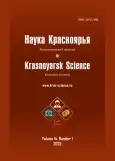Improving the mechanisms of state support for agriculture in the framework of strategic planning
- Authors: Chernyakov V.M.1
-
Affiliations:
- Siberian University of Consumer Cooperation
- Issue: Vol 14, No 1 (2025)
- Pages: 174-194
- Section: Articles
- Published: 31.03.2025
- URL: https://journal-vniispk.ru/2070-7568/article/view/303393
- DOI: https://doi.org/10.12731/2070-7568-2025-14-1-289
- EDN: https://elibrary.ru/XRBRJA
- ID: 303393
Cite item
Full Text
Abstract
Government support for agriculture in Russia requires a systematic analysis to improve efficiency. The purpose of the research was to analyze modern mechanisms of state support for agriculture in Russia using the example of its regions and the experience of foreign countries to identify key problems and develop recommendations for their solution. Research methods include comparative analysis of regulatory documents, econometric modeling, content analysis of development programs, as well as assessment of the effectiveness of budget expenditures. The results of the study showed that existing government support measures have significant potential, but face problems such as bureaucracy, lack of funding, low program effectiveness, and infrastructure deterioration. The most successful practices are inter-household coordination (Omsk region), econometric modeling (Smolensk region) and foreign experience (crop insurance in the USA, support for young farmers in the EU). The scope of the results: regional and federal authorities, developers of agricultural policy, scientific organizations. To increase the effectiveness of government support, it is necessary to introduce digital platforms, increase the amount of government support to 5% of the cost of products, strengthen monitoring of program effectiveness and adapt international best practices. The results can be used by the authorities when adjusting agricultural development programs.
About the authors
Vladislav M. Chernyakov
Siberian University of Consumer Cooperation
Author for correspondence.
Email: mkacadem@mail.ru
Postgraduate Student
Russian Federation, 26 K. Marx Ave., Novosibirsk, 630087, Russian Federation
References
- Digital transformation program of Novosibirsk region. (2024). Ministry of Digital Development of Novosibirsk region. Retrieved from https://digit.nso.ru/page/1382
- Belokopytov, A. V., Kopeykin, D. A. (2024). Improvement of mechanisms for government support of agro-industrial complex in modern conditions of operation. Food Security and Policy, 11(3), 569–580. https://doi.org/10.18334/ppib.11.3.121071
- Kidyaeva, N. A., Illarionov, S. V. (2023). Economic development of rural territories. Young Scientist, (1), 82–88.
- Government Regulation of the Russian Federation No. 696 dated May 31, 2019 (as amended on July 10, 2020). On approval of the state program of the Russian Federation “Comprehensive Rural Territory Development” and amendments to certain acts of the Government of the Russian Federation. Retrieved from https://mcx.gov.ru/upload/iblock/725/725f4b61b8ed39429ca08316f6e7456d.pdf
- Long-term forecast of social and economic development of the Russian Federation until 2030. (2013). Retrieved from http://static.government.ru/media/files/41d457592e04b76338b7.pdf
- Sibiryayev, A. S. (2024). State support for agriculture and rural development: international experience. Herald of NGIEI, (2), 102–108.
- Strategy for Sustainable Development of Rural Areas of the Russian Federation until 2030. (2015). Retrieved from https://docs.cntd.ru/document/420251273
- Presidential decree of the Russian Federation No. 20 dated January 21, 2020. On approval of Food Security Doctrine of the Russian Federation. Retrieved from http://publication.pravo.gov.ru/Document/View/0001202001210021
- Federal Law No. 172-FZ dated June 28, 2014. On strategic planning in the Russian Federation. Retrieved from https://www.consultant.ru/document/cons_doc_LAW_164841
- Federal Law No. 264-FZ dated December 29, 2006 (as amended August 4, 2023). On agricultural development. Retrieved from http://pravo.gov.ru/proxy/ips/?docbody=&nd=102111165
- Chernyakov, V. M. (2024). Methodological approaches to assessing the digital potential of agricultural producers. Bulletin of the Academy of Knowledge, (4), 389–396.
- Chernyakov, V. M. (2022). Problems of assessing the effectiveness of the implementation of the national project “Digital Economy of the Russian Federation.” In Evaluation of Programs and Policies in the Context of New Public Management: Collection of Articles from the 3rd All-Russian Scientific and Practical Conference. Novosibirsk, October 26, 2022 (pp. 181–186). Novosibirsk: NSTU Publishing House.
- Chernyakov, V. M. (2023). Digital transformation: methodology for forming conceptual framework. Science of Krasnoyarsk, 12(2–2), 17–23.
- Chernyakov, M. K., Chernyakov, V. M., Eisenbart, G. A. (2024). Comparative analysis of investment attractiveness evaluation approaches for agricultural entities. In Collection of Proceedings: Socio-economic Development of Rural Territories: Trends of Cooperation (pp. 232–236).
- Chernyakov, V. M. (2024). Investment activity in the agrarian sector of Novosibirsk region. Bulletin of Eurasian Science, 16(4).* Retrieved from* https://esj.today/13ECVN424.html
- Chernyakov, V. M. (2024). Methodology for predicting results of regional agribusiness performance. Bulletin of Siberian Institute of Business and Information Technologies, 13(4), 155–160. https://doi.org/10.24412/2225-8264-2024-4-878
- Cherniakova, M. M., Chernyakov, V. M. (2023). Development of rural territories in Novosibirsk region amid digitization considering risks. In Investment Policy, Investments, and Entrepreneurship in Conditions of Geopolitical Instability Dedicated to Memory of V.I. Ogrodnikov (pp. 162–165).
- Shumakova, O. V., Kosenchuk, O. V. (2019). Enhancing governance mechanism for multifunctionality-based development of agricultural territories. Humanitarian Studies on Human Being, (37), 155–160.
Supplementary files










